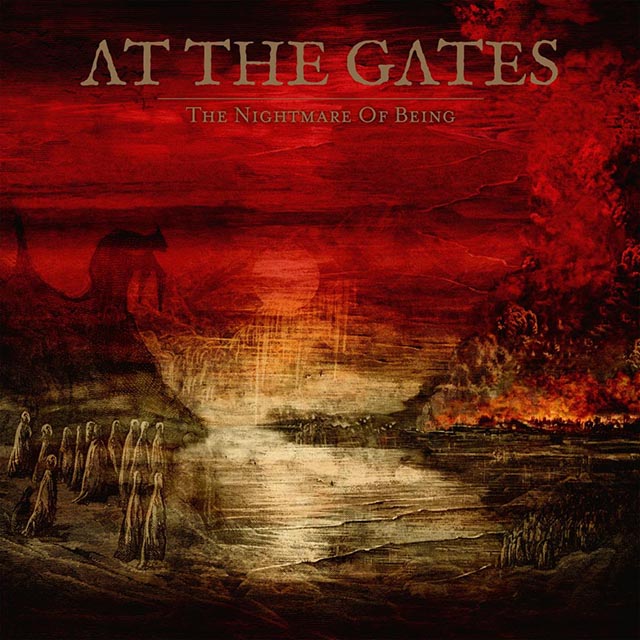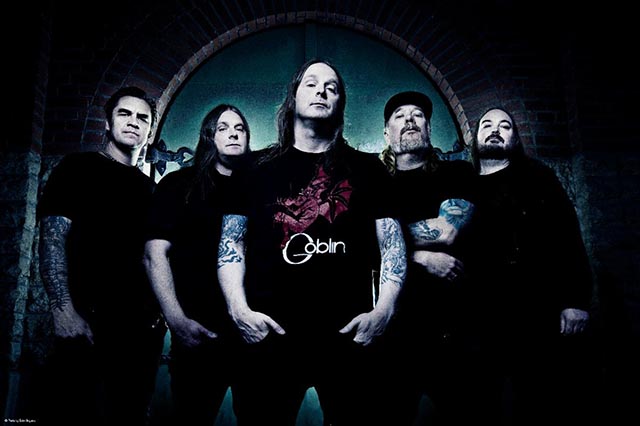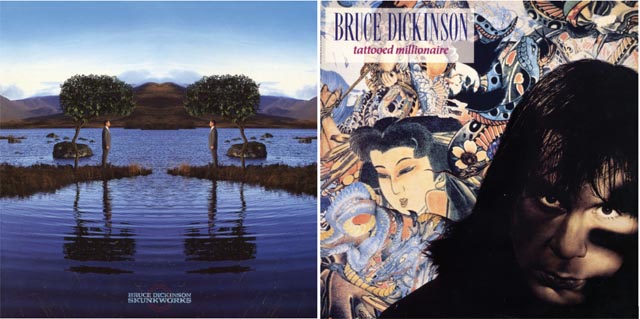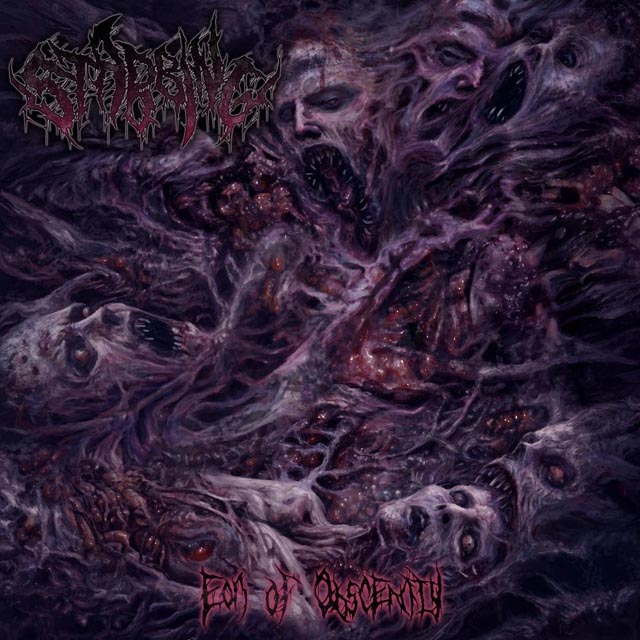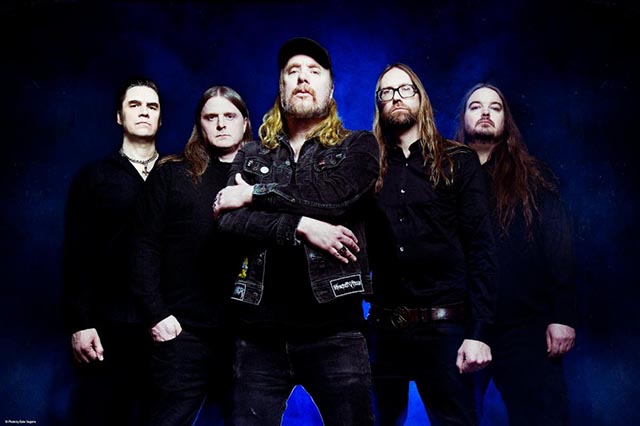
Swedish melodic death metal legends At The Gates have unleashed their new album, The Nightmare of Being, on July 2nd via Century Media Records (order here). We caught up with vocalist Tomas Lindberg to discuss their latest effort and thirty years of At The Gates.
I enjoyed the new album, The Nightmare of Being. and I was just curious if the pandemic has affected the overall creative process?
Not in the sense that the songs are themselves influenced, or the lyrics, by the worldwide depression left in the wake of the pandemic. But, I guess it was our escape a little bit to go dive down into such a big creative project. So maybe the album became more grandiose or something. We could work on it more because there was more time.
It definitely has a bleak viewpoint with songs such as “Touched by the White Hands of Death.” Can you talk more about some of the philosophies on the album?
Well, they actually deal with the concept of a pessimistic philosophy, as you would actually put it, like the anti-philosophy of pessimism. Not that At the Gates had suddenly become pessimists, but more in the vein that I thought it was an interesting subject. And I was intrigued by how much death metal it was to write about it. I got a little bit hooked on some of the ideas from all these writers. I got into the philosophy world and all in all, I still think it’s a dark record, but it still has like that little glimmer of hope. It’s just basically, you had never seen a disappointed pessimist, right?
Not all the time. I mean, it just prepares you for reality.
Yeah, exactly.
Can you talk more about the songs “The Paradox” and “Garden of Cyrus?”
The Paradox is probably one of the more straightforward songs on the record. But it’s a monster in the way that it’s, how can I say, it has a lot of depth to it, even if it’s more straightforward. The same sense, but The Paradox deals with basically humanity being a paradox. That we are the only way to kind of survive in this world, is to act almost nonhuman as humans, having all these defense mechanisms to protect ourselves from the knowledge that we’re going, that we are mortal. The government-side of it is a bit trickier because basically all the ideas on the record are dealing with a good business philosophy, but Garden of Cyprus is more, not approved but, it’s based on a book by Sir Thomas Brown, an old English writer. He was trying to find all of these patterns in nature.
Basically, in my eyes, looking for answers that aren’t there. It’s a bit more esoteric, I guess, the book. But that idea that mankind is searching for the answers, even if the answers clearly aren’t there. That kind of triggered an idea about that song. And in some ways, of course, it’s one of the more progressive songs on the record. And that was a big challenge for us to try to write something like that, but still, how can I say it, make it feel like you were on planet At the Gates still. I think we succeeded, but that’s of course my humble opinion.
I did see a lot of different directions in this record. It’s definitely different from your previous works. How would you compare this record to To Drink From the Night Itself?
I would say we probably needed to do To Drink From the Night Itself to be able to write this record. I’ve always been a fan of bands that have a distinct sound. Even if they could change direction on albums, they still have a distinct sound. You can go with any band. They’re like the death metal world, a band like Enslaved has a lot of different sounds throughout their career, but you still hear that tune. Other bands, a lot of them have that same distinctness to their sound. I think it is interesting to be as creative as you can within your own, the limits of your sound, because anyone can write like a really weird, progressive other with a lot of different elements. It’s easy to just brainstorm and get everything out there. But if you’re at the same time, a bit confined by the borders of the sound that band has, that’s the challenge that drives us forward, to inspire us to write an album like this.
I would say To Drink From the Night Itself might’ve been a little reaction almost after a golden reality. It was a little bit, not too clean but a little bit crispy. And To Drink From the Night Itself was more like a death metal album, darker and grittier. I heard a lot of people mentioning they didn’t like the production of that record and almost sounded like a lot of people thought that was like a mistake that it sounded like it did, but it was a carefully planned idea, to have it have a grittier, dirtier sound. And then after that, when we wanted to do the more diverse record before, we wanted to use the unspoken again for this one, because there’s so much going on on the record that everything needs to be audible and clear in that sense. But we went for a more analog sound picture.
Which songs for you were more challenging to write and piece together for this record?
The songs are challenging in different ways, I would guess. You could say, as a song like “Spectre of Extinction,” the first single, doesn’t seem maybe at first listen, that it’s so surprising because it’s pretty much a normal At the Gates strikes, so to say. But for us to write a song like that is still a challenge because we already wrote songs like that. So how do we do it, but still make it interesting. Of course it’s more obvious with a song like “The Fall Into Time.” Maybe that is the longest song of the record and has the most intricate parts. But it’s different kinds of challenges all the time. I think the overall challenge was to make it not stick out too much, to just sound like a unit, the whole record. And I think that comes down to a lot of the track ordering, to make it get the flow, the natural flow in the record.
You guys recently celebrated your 30th anniversary and musically, how do you think you’ve evolved since 1992’s The Red In The Sky is Ours?
Well, I guess the main difference is that the youthful, pretentiousness has been changed to, what we call it, more mature ambitiousness. I think that the biggest difference is of course that we have written a lot of songs over this time and that has evolved us as songwriters, arrangers of songs. We are still as curious and this still means a lot or everything to us in that sense. I just think it’s important in another way. It’s maybe even more important now than it was when we were 18. But it is the same sentence, you can say, because it takes a lot more effort to do it physically, almost at our age. And also because who knows how many albums we still get to do? And then every album seems more and more important, you know?
Of course. Speaking of performance, the US has tours being announced, selected countries have nothing till next year. It’s still a mix right now between live shows and having livestream events. What do you guys have plans for the new album? Is there going to be a live-stream, a few shows or…
It’s really hard to foresee how everything’s going to end up. We have still confirmed shows. That isn’t announced yet, but we of course don’t know what’s going to happen with them. We do have a lot of shows confirmed that should have already been played. There are going to be the next year instead. So 2022 is already starting to get full, but the rest of 2021, we have to see and wait a little bit until we know what’s going on. Of course, worst case sort of saying, we have to settle for meeting our fans online, even though I rather we do it in a live setting of course. But it’s a little bit too hard to know exactly what’s going on yet.
Is there anything else that you want to say or add about the album?
We are very much looking forward to hearing all the reactions from the people with this. The more monster of the record that it is like the most full with At the Gates record so far. And I’m very much looking forward to hearing reactions to it.
I think from the first listen, it caught my attention. I really like it so far. And I hope your listeners will think the same thing as well.
As I say, they’re the inspiration for us to go forward. So I think that their open-mindedness has taken us this far. So I trust in them to understand what we do. We’re trying to do this time as well.
